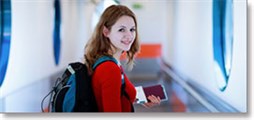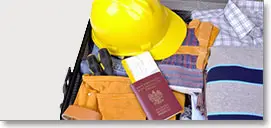Steps before you leave
 Plan, plan, plan…make this your motto!
Plan, plan, plan…make this your motto!
The better prepared you are for the move, the better your first days in Australia will be. Time is on your side, so don’t delay. We have outlined the TOP TEN things to start researching, doing, and planning for.
1. Settle your affairs
Pay your debts. Review your insurance policies. Cancel your direct debits, and monthly services, and obtain the necessary proof. Sell your real estate and motor vehicles, or make solid plans on how to manage them from Australia.
With all the stress of moving to another country it is easy to overlook the small details and leave loose ends. Don’t decide you’ll deal with it later, as organising financial affairs from a distance is often costlier and more stressful than doing it at home.
Some payments you may need to cancel, suspend or notify of change of address:
• utilities: electricity, gas, water
• cable television subscription
• phone and Internet plans
• health insurance policies
• home and contents insurance
• club memberships
• school fees
• newspapers and periodicals
• gym memberships
• video library membership
• charity organisations
• motoring organisations
Check that you haven’t left any items with the dry cleaner, shoe repairer etc. Also return any outstanding DVDs, library books, and items borrowed from friends or family.
2. Research living costs
Before you leave, you should have an idea of the cost of living in the city you are moving to. You should work out the approximate costs of rent, travel passes, basic bills, medical insurance, and any special services you might need.
It is always possible to limit spending on things like food, entertainment and clothing but not for fixed expenses such as electricity. Falling behind on rent and utilities bills could give you a bad credit rating, which might make it harder to get a mortgage or bank loan at a later date.
3. Gather your important documents
Ensure that your passport is valid. Depending on the agreement with your home country, you may also require a visa or Electronic Travel Authority (ETA) to enter Australia. The Australian Customs and Border Protection Service website contains information on entry requirements, and the goods you can have on you upon arrival.
If your country permits it, is wise to get a copy of your health records/history for future medical reference by Australian doctors, especially if you have a medical condition. This will save you the difficult task of tracking down information once you are overseas.
It is a smart idea to sign up to a free cloud storage service such as Dropbox as a safe way to store electronic copies of your documents should they get lost or stolen. Simply scan the documents in a PDF format, and upload them to Dropbox.
4. Research what you can import into Australia
As an island nation, Australia has managed to remain free of diseases such as foot-and-mouth and avian influenza (bird flu). The Australian Government, therefore, treats bio-security very seriously. It is very important that any items carrying dirt, mud, or organic material such as gardening equipment, sporting equipment, footwear, and bicycles are thoroughly cleaned before they are packed.
If you are in doubt about whether you should bring an item into Australia, either leave it behind or declare it on arrival in order to avoid a fine or prosecution.
Consult the Department of Health and Ageing list of regulated medications, which require a permit to bring them into Australia.
The Australian Custom Services website contains fact sheets (in multiple languages) explaining what you can and cannot bring into the country.
5. List your necessities and pack quality items
 Make a list of everything you will need to buy to set up your home in Australia, down to knives and forks. The list might become very long, but it will give you a realistic idea of your needs. This will help you to avoid spending too much when shopping for household items.
Make a list of everything you will need to buy to set up your home in Australia, down to knives and forks. The list might become very long, but it will give you a realistic idea of your needs. This will help you to avoid spending too much when shopping for household items.
Even if you bring a comfortable amount of savings, it is best to avoid expensive shopping trips until you find a job and a place to live. With this in mind, try to pack extremely useful personal items for your few months in the country.
In terms of clothing, consider the weather and season in the part of the country you are moving to, and important situations such as job interviews. Outside of work, Australians generally dress in a casual but tidy manner; much the same as people in other modern western countries. In summer, a swim suit (called ‘swimming costume’) is an essential item!
6. Increase your savings
Be prepared for proof of savings depending on the type of visa on which you are entering Australia.
Holders of a working-holiday visa require a minimum of $5,000 upon arrival.
If you are entering on a skilled migrant visa, you will not need to declare how much money you have. However, it is extrememly wise to have a sufficient amount of cash to support you until you find work, which may take time. Keep in mind, migrants to Australia are not eligible for unemployment benefits for two years.
7. Get final health checks
It is a good idea for you and your family to have final checks by your doctor and dentist before you leave your home country. These health professionals know you and your state of health, and it may take some time to find a doctor and dentist you are comfortable with in Australia.
8. Take advantage of cheaper services
Australia has one of the highest costs of living in the world. To save money, make use of services that are cheaper in your home country before you leave. For example, dental services are very expensive in Australia. If you need a new crown on your tooth. get it done before you move!
9. Find temporary accommodation
 If you don’t have any family or friends who can offer temporary accommodation, research the cost of hotels, serviced apartments, or short-term rentals well in advance. Be sure to make a reservation as early as possible because a public holiday or high-season might leave you without a place to sleep when you arrive.
If you don’t have any family or friends who can offer temporary accommodation, research the cost of hotels, serviced apartments, or short-term rentals well in advance. Be sure to make a reservation as early as possible because a public holiday or high-season might leave you without a place to sleep when you arrive.
Choose a good-value, convenient location that will allow you to move around easily in your search for a permanent home. Research the local public transportation and shopping facilities before you book. If you have children, ensure there are facilities like a park and pool nearby to make life easier!
10. Obtain the appropriate financial tools
Decide well in advance how you will handle your money. Will you carry cash? Will you mainly rely on credit cards or travellers’ cheques? Be aware that most hotels and serviced apartments require a credit card number as a deposit when checking in. Rental payments on residential properties are usually made online via credit or debit card. While it is risky to carry around a lot of cash, it is difficult to keep track of spending on cards. Always keep track of the current balance.
Opening a bank account before you arrive in Australia is a great option. You can then transfer money into the account from your current bank and have direct access to your finances the minute you land here.


